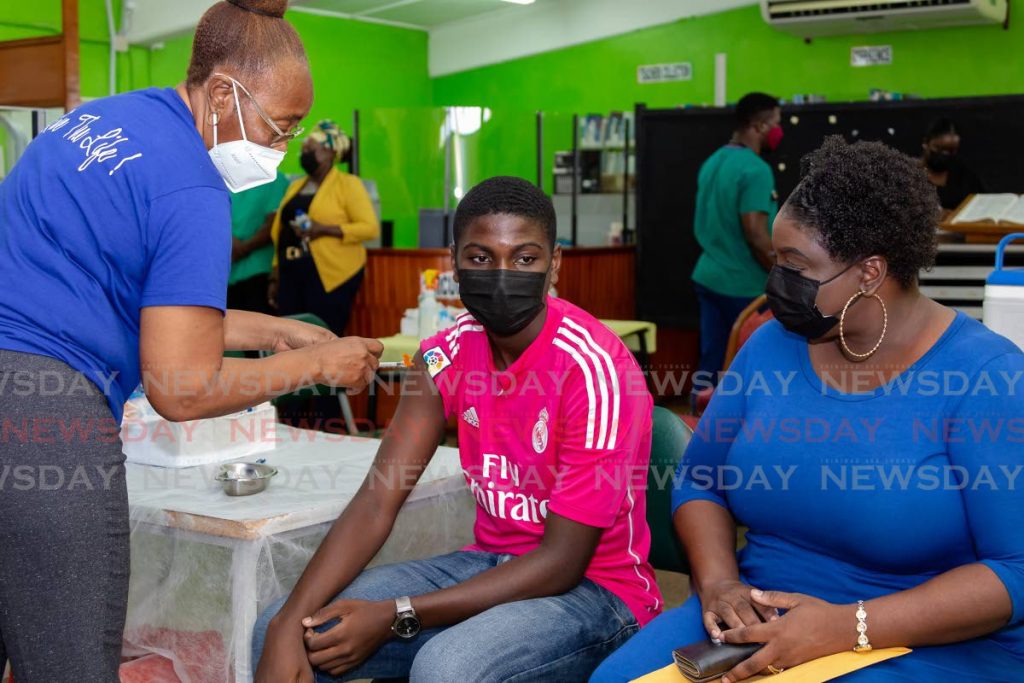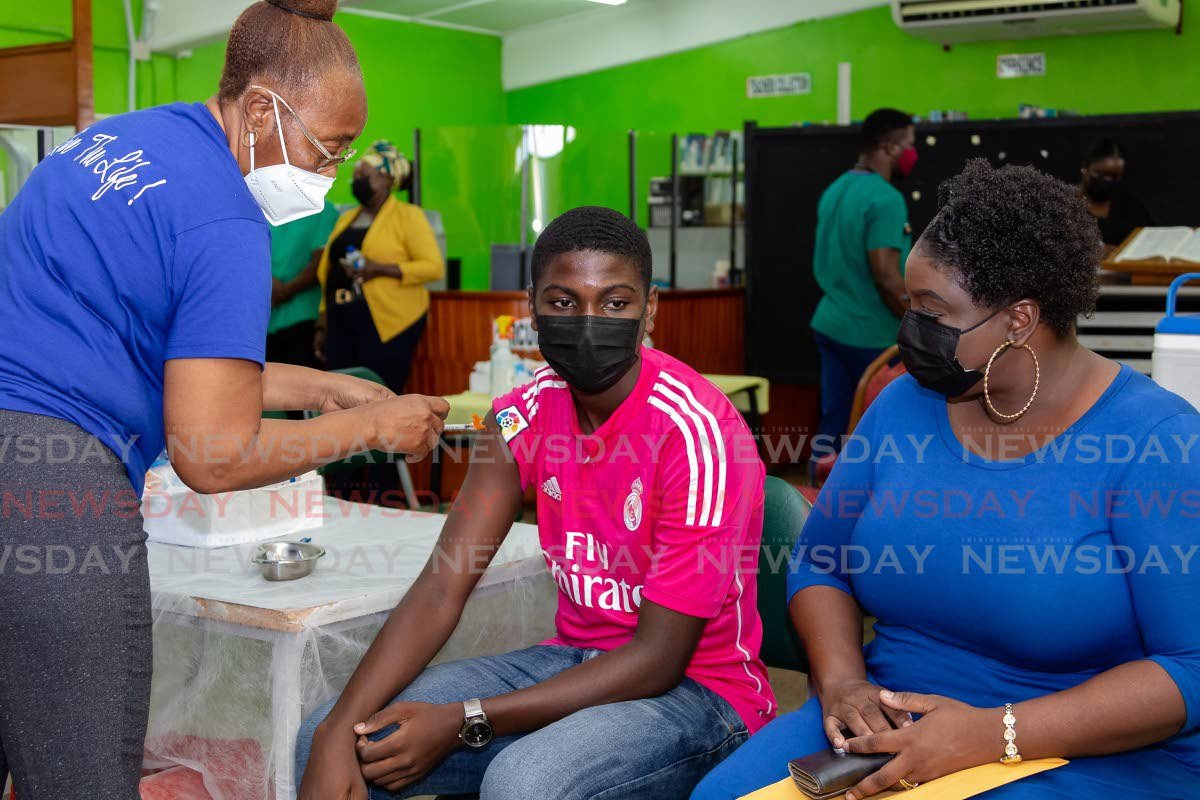Doctors advise parents: Severe Pfizer side effects rare in children

Experts are advising parents not to worry about myocarditis and pericarditis, the rare side effects of the Pfizer covid19 vaccine in children, and to get them vaccinated.
Myocarditis is the inflamation of the heart, while pericarditis is the inflamation of the lining or sac in which the heart beats.
Pfizer is the only WHO-approved vaccine for people 12 years old and older, and the roll out of the vaccination programme for children 12-18 began on August 18.
Dr Peter Chin Hong, an infectious disease specialist at the University of California, San Francisco, said the risk of anyone taking the vaccine and getting myocarditis or pericarditis was about 12 in one million, and about one or two in one million with children.
“I think people have a hard time understanding what risk is. If you compare it to the risk of other activities – the risk of drowning at Maracas, getting struck by lighting in the Queen’s Park Savannah – it’s rarer than many of the common things people think about. It’s so rare (getting the diseases through vaccination) I’ll be shocked if any of the 150,000 people TT vaccinates get anything given the numbers.”
He said, in general, inflamation in the body was a good thing because it meant the immune system was responding to the vaccine.
“When the immune system makes something to recognise a foreign invader, it’s like a lock and a key. So some of your cells in the body might look like a foreign invader and might trick the immune cells to go there. When the immune cells go there, it starts to get a little angry and annoyed – that’s inflamation. But, it figures out this isn’t really the real deal so it kinda goes away.”
He said getting myocarditis or pericarditis associated with mRNA vaccines, including Pfizer and Moderna, was similar and stressed that the cases were mild and people recovered in a about a week.

He added that the risk of getting myocarditis and pericarditis from covid19 was much higher. Also children could get the inflammatory diseases for different reasons including infections, cancer, and autoimmune diseases.
He said two good reasons to get a child vaccinated were first to protect the child, and second, to protect the family.
“You just don’t know which of the kids who get covid is going to get severely sick or MIS-C (multisystem inflammatory syndrome in children). We just can’t predict who’s going to get it.”
Also, while, in general, children’s immune systems are stronger than adults and they may not get a severe case of covid19, they are also sources of transmission of the virus and could get adults in the home sick. And even if the cases were not severe, the whole family would have to isolate, disrupting school and work.
At the Health Ministry’s virtual press conference on August 16, Dr Joanne Paul, head of the Paediatric Emergency Department, Eric Williams Medical Sciences Complex, Mt Hope said the mRNA technology used to create the vaccine has been around for 30 or 40 years. It was used to create the Zika, rabies and influenza vaccines among others.
“Children are very strong in terms of responding to these vaccines, they handle it very well, and we have had an entire history of children and vaccines with no issues whatsoever.”

She said the vaccination programme was an effort to protect all TT’s children from getting MIS-C, of which TT had 52 cases so far. Yet, the focus was on vulnerable children – those with diabetes, hypertension, obesity, asthma, cerebral palsy, autism, epilepsy, Down Syndrome, heart and kidney diseases, weakened immune system, sickle cell disease, and other conditions – or children living with a vulnerable individual.
“The vaccine is meant to be a milder or piece of the virus so it makes sense that some of the complications, milder, rare complications, would be stuff that the covid infection actually already does. So in fact, covid causes myocarditis, causes clots. Long covid has myocarditis in it (as an effect), and also has effects on your lungs especially.”
She added that MIS-C causes inflamed blood vessels, myocarditis, and affects other organs. And that MIS-C, long covid, and the delta variant, which was causing more covid19 cases in children and young adults, had a lot more effects compared to a mild case of myocarditis.
She too stressed that only one or two children in one million were at risk of getting myocarditis or pericarditis.
“It means that we’ll actually have to vaccinate the entire Caribbean (12-18 year old population) to actually have one case. It’s so uncommon and if it does happen, it’s mild. Also all recovered.”
She advised parents and guardians to call their paediatricians and get the facts of the vaccine if they had concerns. She also suggested they prepare for the period after vaccination by letting the children rest for a week, making them drink lost of fluids, giving them paracetamol or ibuprofen if they have soreness or fever, and liaise with a paediatrician.
Also at the press conference, Chief Medical Officer Dr Roshan Parasram gave the efficacy rates of the Pfizer vaccine seven days after the second dose.
In trials, it was 95 per cent effective against symptomatic disease in those 16 years and older and close to 100 per cent against symptomatic disease in those 12 to 15 years old.
Real world usage revealed a 92 per cent reduction of infection, 94 per cent for symptomatic disease, 87 per cent for hospitalisation, and 92 per cent for severe disease.
It was also 88 per cent effective against symptomatic disease cause by the delta variant, 93.7 per cent against alpha and 75 per cent against beta.
To those who did not want their children getting the Pfizer vaccine because it was for “emergency use,” Chin Hong said he understood why people were worried about the label. However, the criteria of six months of data for the US Food and Drug Administration (FDA) approval had already been met and the official stamp of approval was on the way.
“That argument will be gone in about a month because the FDA is going to fully approve it. For those people who say it’s experimental, we already have all the data. Look at how many millions of people around the world, including those 12 and above, have gotten the vaccines.
“This is the most studied intervention ever so far and it’s been more than a year now. So for people saying ‘Oh the vaccines just came out yesterday.’ That argument is getting less and less applicable.”
He still advised that parents monitor their children for chest pains, shortness of breath, fast or irregular beating of the heart that does not go away after vaccination.



Comments
"Doctors advise parents: Severe Pfizer side effects rare in children"